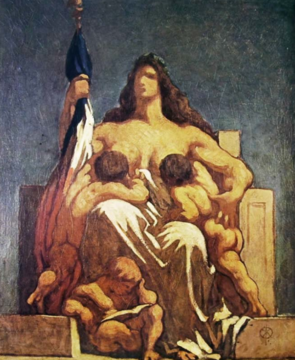by Rafaël Newman

Before the first round of voting in the French legislative elections on June 30, the author and activist Edouard Louis posted the following on Instagram:
To those who would still be loath to vote for the Nouveau Front Populaire on Sunday because they have too many differences with one fraction or another of this union of leftwing parties: when you cast your vote, the political issue at stake is not whether you can find someone, a party, an individual, an alliance, with whom you might be perfectly in agreement on all things. Absolute agreement does not exist: we are never totally in agreement with others, including with those in our own camp, including with our closest friends, including with ourselves. Who has never come home of an evening turning over something they’ve said during the day and wondering, “Now why did I say that?” Since perfect and total agreement is an impossible fantasy, the issue at stake is rather: how can we create a space of disagreements that would render our disagreements effective, creative? How can the disagreements among La France Insoumise, the Verts and the PS be the point of departure for a more inventive, a more progressive politics?
What Louis is evoking here—the constructive interaction of differences in the name of a greater good—is in effect the basic recipe for politics: bringing together disparate actors with a common stake so that they can work on producing compromise solutions to complex problems. What is also commonly known as collaboration.
In the event, two weeks later, after the second round of voting in France on July 7, an unusually high turnout and a successful strategy of selective withdrawal of candidates have produced the potential for a situation known as cohabitation, in which the President of the French Republic represents a different party from that holding a majority (or at any rate forming the government) in the Assemblée Nationale. At least, that is what will almost inevitably be the case, unless Emmanuel Macron is able to split the left and form a centrist coalition with rightwing Socialists and the rump of the old Gaullist party.
The Fifth Republic was established in 1958 precisely to prevent such situations, since its predecessor had been plagued by governmental instability and a Weimar-like profusion of parties forming shaky alliances. Since then, an invigorated French presidency has only had to face cohabitation three times, since the relative strength of the traditional parties has tended to pit just two opponents against one another in runoff elections. Now, in the 2024 legislative election, the withering of the traditional center left and the exponential rise of the far right produced an unusually high number of so-called triangulaires, or three-way races, in the second round; and the electorate in many places, determined to avoid a surge by the right and to form a “republican front” against it, deployed strategic voting to favor the candidate most likely to beat Marine Le Pen’s Rassemblement National, whether that candidate was from the left-wing Nouveau Front Populaire or Macron’s centrist Ensemble.
But why do the French use the relatively inert, even cynical term cohabitation (what the Americans, with their similarly presidential system, more hopefully call “bipartisanship”—that is, until it devolves into “gridlock”) rather than collaboration, certainly a more dynamic, more sanguine concept? Could it be that collaboration, in a political context, leaves an unpleasant taste in French mouths, due to France’s particular entanglement with the Third Reich? (Hence the joke: among the French words for a work colleague is collaborateur—except in Vichy, where everyone claims to have been a Résistant…)
Or perhaps it is because cohabitation, borrowed from a private rather than a public context, reflects a venerable conception of the nation as a family, a collection of people assembled to inhabit the same domestic space, albeit one in which the head (of family or state) faces a potentially antagonistic clan (or parliament).
Geoffroy de Lagasnerie, the French philosopher and activist who frequently collaborates (!) with Louis and Didier Eribon in political activism and theoretical work, as well as in friendship, offers a sinister interpretation of this organicist construction. In his calls for broad leftwing solidarity and a progressivist remaking of the French state, de Lagasnerie cites Horkheimer and Adorno on the traditional family—an asymmetrical cohabitation featuring a powerful paterfamilias and an assembly of subaltern dependents—as the staging ground for fascism. De Lagasnerie—who has published a blueprint for an alternative socio-familial structure based on tripartite friendship to complement, if not challenge, the nuclear model—sees the need for progressive educational institutions to teach attitudes counteracting the basic reactionary tendency instilled by the unevenly hierarchical arrangement of the traditional family, and thus for a state that is not based on putatively “natural” or “organic” principles, but instead on politics.
De Lagasnerie further recalls Pierre Bourdieu on the privileging of home ownership under capitalism as an obstacle to labor activism, since the requirement for would-be members of the middle class to pay off a mortgage makes it impossible for them to go on strike, thus reinforcing the primacy of private property and the domestic space—where the homeowner/paterfamilias is king in his castle—over shared responsibility and the democratic public sphere. This imperative—to enter the system of private deeds, rents, and capital—then additionally strengthens a tendency to view—and construct—the state on family lines, which in turn mirror and confirm the apparent “naturalness” of an enforced domestic arrangement that supports a neoliberal understanding of the state (with a paternalist employment structure intervening between the two realms).

Obscuring the patriarchal subtext of the French presidential model, meanwhile, is its superimposition over a venerable imaginary of the nation as a motherland, suggested in the patriotic deployment of heroic female allegorical figures such as Marianne, or historical icons like Jeanne d’Arc, to symbolize “true,” or revolutionary, or renascent France; or as in Honoré Daumier’s 1848 portrait of France as a mother nursing her various children—or rather, nursing one on each breast, while a third sits at her feet, studying a text.
Immediately following the second round, Marine Le Pen, the leader of the far-right, nativist Rassemblement National, or RN (what Louis continues to call the Front National, or FN, re-inscribing the persistence of its earlier, more overtly fascist instantiation), took advantage of such idealizing allegories to describe the strategic voting that had deprived her party of its predicted majority as “contre nature,” or unnatural. As if all those who had strategically voted for parties or blocs other than hers had been committing an offense against nature, rather than performing the most basic act of politics. As if her own party’s vicious program of drastically restricting immigration, fostering Islamophobia, and curtailing the rights of “binationals” were somehow natural, rather than frankly racist.

In the immediate aftermath of the Second World War and the racist violence wrought across much of Europe, in The Origins of Totalitarianism, Hannah Arendt issued a judgment of the profoundly anti-political, indeed anti-natural construction of “race” that has been echoed since by theorists such as Ta-Nehisi Coates:
Racism may indeed carry out the doom of the Western world and, for that matter, of the whole of human civilization. When Russians have become Slavs, when Frenchmen have assumed the role of commanders of a force noire, when Englishmen have turned into “white men,” as already for a disastrous spell all Germans became Aryans, then this change will itself signify the end of Western man. For no matter what learned scientists may say, race is, politically speaking, not the beginning of humanity but its end, not the origin of peoples but their decay, not the natural birth of man but his unnatural death.
The Rassemblement National is a party of death, not of politics, and certainly not of nature, for all that this last term is notoriously slippery, constantly threatening to coagulate historically motivated, contingent cultural practices into iron biological necessities. What could be more “natural,” after all, than a mother nursing her children, while a father stands guard over them—or rather, absents himself in the name of providing for them, or defending them against external Others, returning just long enough to bring nourishment and lay down the law? And what could possibly be wrong with a nation based on these same principles, whereby a strong, solitary leader crystallizes the will of his tribe, directing them effortlessly in harmonious times, and struggling to make the voice of reason heard in periods of more rancorous cohabitation? Nor should the fact that Marine Le Pen aspires one day to hold the French presidency as its first female occupant obscure the patriarchal nature of the arrangement: for feminism as a critique of the structures of domination teaches us that such systems construct the very roles they assign as putatively “natural,” and that the putative biological sex of the dominator is of systemic irrelevance.
Our duty as contemporary, progressive political citizens, then, is to challenge the extrapolation of phantasmic, private, familial “inevitabilities” into the public sphere, whatever our particular domestic arrangements, whether in France or beyond. Because of course France is not the only country in which the domestic is projected onto the political: in a recent review article in the LRB, Tom Crewe writes of the tendency of even England’s Labour politicians to describe national finances in Thatcher-era domestic terms (whereby the exchequer is to be managed as analogous to “mum’s” household budget).
It happens that I was in Paris this past June 30, staying in the part of town I have been visiting with my partner since graduate school in the early 1990s. We had business to take care of but took time out for a museum, some music, and a late-afternoon coffee with an old friend. As the evening approached, Claire grew restless, and at 8 o’clock departed to watch the (initially disheartening) returns on television.
Claire had of course cast her own ballot that day, as well as voting by proxy for people who had assigned her their procuration on a website maintained by the NFP. Caroline and I were left to reflect on the historical moment occurring around us, but of which we were not an immediate part: quite properly, since we do our voting in Switzerland, where we are citizens by right of birth, in her case, and residence, in mine, and where the government is routinely formed in coalition, without a strong single leader. We sat in the little living room where we had written our dissertations decades ago, the same space in which we had been cohabiting on and off in the period since, and where we had so often collaborated on projects large and small, public and private. It was a domestic moment infused with politics; and while our own particular proclivities and tastes have surely influenced our political activities, it has also been possible, indeed imperative, that we distinguish clearly between the two spheres. As well as that we avoid privileging totalitarian fantasies of organic harmony and consanguinity. “Absolute agreement does not exist,” after all: “we are never totally in agreement with others, including with those in our own camp, including with our closest friends, including with ourselves.”
Divided identities; shifting alliances; difference and solidarity; cohabitation and collaboration. What could be more political? What could be less organic? What could come more naturally?
